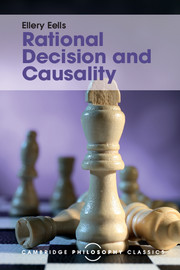Book contents
- Frontmatter
- Dedication
- Contents
- Preface to this edition
- Preface
- Introduction
- 1 Bayesianism
- 2 The philosophical and psychological significance of Bayesian
- 3 Bayesian decision theories: some details
- 4 The counterexamples
- 5 Causal decision theories
- 6 Common causes, reasons and symptomatic acts
- 7 A general defense of PMCEU
- 8 Newcomb's paradox
- Appendix 1 Logic
- Appendix 2 Probability
- Bibliography
- Index
- Frontmatter
- Dedication
- Contents
- Preface to this edition
- Preface
- Introduction
- 1 Bayesianism
- 2 The philosophical and psychological significance of Bayesian
- 3 Bayesian decision theories: some details
- 4 The counterexamples
- 5 Causal decision theories
- 6 Common causes, reasons and symptomatic acts
- 7 A general defense of PMCEU
- 8 Newcomb's paradox
- Appendix 1 Logic
- Appendix 2 Probability
- Bibliography
- Index
Summary
In the Newcomb situations described in Chapter 4, the principle of dominance and our intuitions agreed that one act was correct while it seemed that PMCEU prescribed the other act. Newcomb's paradox, presented in the introduction, involves a decision situation which is, as we shall see, essentially identical in structure to the Newcomb situations of Chapter 4. However, people's intuitions seem not to be as committed to the correctness of the prescription of the principle of dominance in the decision situation of Newcomb's paradox (i.e., taking both boxes) as they are in the other, less fantastic, Newcomb situations. Indeed, there is much controversy as to which act is correct in Newcomb's paradox. As I indicated in the introduction, I believe that the correct act is to take the contents of both boxes. However, my goal in this chapter is not to convince the reader of this. I shall do three things in this chapter, the third of which is the most important. First, I shall summarize some of the main existing arguments for the correctness of one act or the other in Newcomb's paradox. My main reason for presenting these arguments – with minimal evaluation – is to help the reader gain a deeper understanding of the controversy and the kinds of considerations brought to bear on each side. Second, I shall suggest a way of making one of the arguments in favor of taking the contents of both boxes more persuasive. And third, I shall show how the analysis of Newcomb situations developed in the previous chapters can be applied to Newcomb's paradox. This will show that, contrary to what has generally been thought, one can consistently be both a CEU-maximizer and a “two-boxer”: the choice between being a one-boxer and being a two-boxer is not a choice between being and not being a CEU-maximizer.
I shall present three one-box arguments and three two-box arguments. The first one-box argument is the best known and was already presented in the introduction: Given that I take only the contents of the opaque box, the probability is almost 1 that the predictor predicted this, so that I would get the $1,000,000; given that I take the contents of both boxes, the probability is almost 1 that the predictor predicted this, so that I would get only $1,000; therefore I should take only the contents of the opaque box.
- Type
- Chapter
- Information
- Rational Decision and Causality , pp. 188 - 199Publisher: Cambridge University PressPrint publication year: 2016

